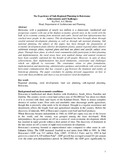The experience of sub-regional planning in Botswana: achievements and challenges
Date
2007Author
Mosha, A.C.
Publisher
United Nations Centre for Regional Development, http://www.uncrd.or.jpType
Published ArticleMetadata
Show full item recordAbstract
Botswana, with a population of nearly two million is a democratic, landlocked and prosperous country with one of the highest economic growth rates in the world with the bulk of its economy coming from minerals and cattle. Social and line infrastructure has reached most people in the country. This development has been brought about through careful national development planning as well as through sub national planning. Sub national planning, the subject of this paper, has been through the preparation of economic development plans (district development plans), spatial regional plans (district settlement strategic plans, regional plans and land use plans) and specific subject area plans. Through these plans, in which rural communities fully participate in their planning and implementation, the rural areas have seen marked change and natural resources have been carefully exploited for the benefit of all people. However, in spite of these achievements, their implementation has faced limitations, constraints and challenges which are difficult to overcome. The constraints relate to plan formulation, implementation and monitoring, administrative guidance and problems with vertical and horizontal communication that has created a gap between the intention and reality of bottom-up planning. The paper concludes by putting forward suggestions on how to overcome these problems and chart a way forward for rural development.

